Avnrt - Samenvattingen, Aantekeningen en Examens
Op zoek naar een samenvatting over Avnrt? Op deze pagina vind je 105 samenvattingen over Avnrt.
Pagina 3 van de 105 resultaten
Sorteer op
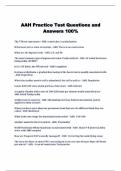
-
AAH Practice Test Questions and Answers 100%
- Tentamen (uitwerkingen) • 8 pagina's • 2024
-
- €15,10
- + meer info
The T Wave represents - ANS: ventricular re-polarization If the heart is in a state of asystole - ANS: There is no contraction What are the bipolar leads - ANS: I, Il, and Ill The most common type of supraventricular Tachycardia is - ANS: AV nodal Reentrant tachycardia (AVNRT) In 2:1 AV block, the PR interval - ANS: Lengthens In sinus arrhythmia, a gradual decreasing ofthe heart rate is usually associated with: - ANS: Expiration When the cardiac muscle cell is stimulated, the cell is said ...
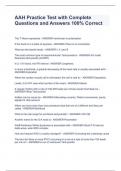
-
AAH Practice Test with Complete Questions and Answers 100% Correct
- Tentamen (uitwerkingen) • 8 pagina's • 2023
-
Ook in voordeelbundel
-
- €10,23
- + meer info
AAH Practice Test with Complete Questions and Answers 100% Correct AAH Practice Test with Complete Questions and Answers 100% Correct AAH Practice Test with Complete Questions and Answers 100% CorrectThe T Wave represents - ANSWER-ventricular re-polarization If the heart is in a state of asystole - ANSWER-There is no contraction What are the bipolar leads - ANSWER-I, II, and III The most common type of supraventricular Tachycardia is - ANSWER-AV nodal Reentrant tachycardia (AV...
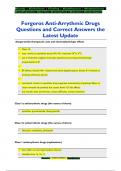
-
Forgoros Anti-Arrythmic Drugs Questions and Correct Answers the Latest Update
- Tentamen (uitwerkingen) • 22 pagina's • 2024
-
- €13,15
- + meer info
disopyramide therapeutic uses and electrophysiologic effects Class 1A uses: similar to quinidine (treat AFl, AF, reentrant SVTs, VT) use is limited by negative inotropic potential and strong anticholinergic propertiesterm-91 EP effects: blocks NA+ channel and slows depolarization, blocks K+ channel to prolong refractory period comments: similar to quinidine (may suppress automaticity of purkinje fibers or cause torsades de pointes) but causes fewer GI side effects dry mouth...
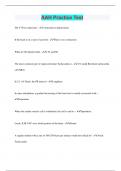
-
AAH Practice Test | 2023 | 135 Questions with 100% Correct Answers | Updated & Verified
- Tentamen (uitwerkingen) • 16 pagina's • 2023
-
Ook in voordeelbundel
-
- €15,10
- + meer info
The T Wave represents - ventricular re-polarization If the heart is in a state of asystole - There is no contraction What are the bipolar leads - I, II, and III The most common type of supraventricular Tachycardia is - AV nodal Reentrant tachycardia (AVNRT) In 2:1 AV block, the PR interval - Lengthens In sinus arrhythmia, a gradual decreasing of the heart rate is usually associated with: - Expiration
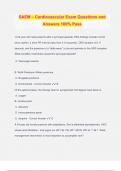
-
SAEM – Cardiovascular Exam Questions and Answers 100% Pass
- Tentamen (uitwerkingen) • 8 pagina's • 2024
-
- €12,18
- + meer info
SAEM – Cardiovascular Exam Questions and Answers 100% Pass A 23-year-old male presents after a syncopal episode. EKG findings include normal sinus rhythm, a short PR interval (less than 0.12 seconds), QRS duration of 0.11 seconds, and the presence of a "delta wave" (a slurred upstroke to the QRS complex). What condition most likely caused the syncopal episode? A. Vasovagal reaction B. Wolff-Parkinson-White syndrome C. Brugada syndrome D. Dextrocardia - Correct Answer ️️ -B Of t...
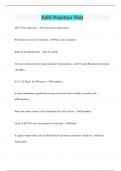
-
AAH Practice Test
- Tentamen (uitwerkingen) • 16 pagina's • 2024
-
Ook in voordeelbundel
-
- €9,74
- + meer info
AAH Practice Test The T Wave represents - ventricular re-polarization If the heart is in a state of asystole - There is no contraction What are the bipolar leads - I, II, and III The most common type of supraventricular Tachycardia is - AV nodal Reentrant tachycardia (AVNRT) In 2:1 AV block, the PR interval - Lengthens In sinus arrhythmia, a gradual decreasing of the heart rate is usually associated with: - Expiration When the cardiac muscle cell is stimulated, the cell is...
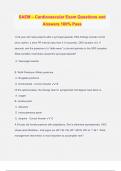
-
SAEM – Cardiovascular Exam Questions and Answers 100% Pass
- Tentamen (uitwerkingen) • 8 pagina's • 2024
-
- €12,18
- + meer info
SAEM – Cardiovascular Exam Questions and Answers 100% Pass A 23-year-old male presents after a syncopal episode. EKG findings include normal sinus rhythm, a short PR interval (less than 0.12 seconds), QRS duration of 0.11 seconds, and the presence of a "delta wave" (a slurred upstroke to the QRS complex). What condition most likely caused the syncopal episode? A. Vasovagal reaction B. Wolff-Parkinson-White syndrome C. Brugada syndrome D. Dextrocardia - Correct Answer ️️ -B Of t...
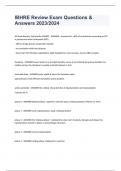
-
IBHRE Review Exam Questions & Answers 2023/2024
- Tentamen (uitwerkingen) • 15 pagina's • 2023
-
- €8,76
- + meer info
IBHRE Review Exam Questions & Answers 2023/2024 AV Node Reentry Tachycardia (AVNRT) - ANSWER-- accounts for ~60% of arrhythmias presenting as SVT or paroxysmal atrial tachycardia (PAT) - affects all age groups and genders equally - no correlation with heart disease - heart rate 150-250 bpm, palpitations, light-headedness, near-syncope, narrow QRS complex rheobase - ANSWER-lowest point on a strength duration curve at an infinitely long pulse duration; for cardiac pacing, the rheobase i...
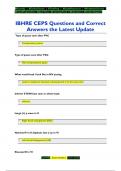
-
IBHRE CEPS Questions and Correct Answers the Latest Update
- Tentamen (uitwerkingen) • 151 pagina's • 2024
-
Ook in voordeelbundel
-
- €16,07
- + meer info
Type of pause seen after PVC Compensatory pause Type of pause seen after PAC Non-compensatory pause What would lead I look like in BiV pacing small or isoelectric because activating both V at the same time Inferior STEMI best seen in which leads inferiors Large (+) p wave in II Right Atrial enlargement (RAE) Notched P in II; biphasic late (-) p in V1 Left Atrial Enlargement (LAE) Elevated R in V1 #Examify | #OnlineExams | #TestPrep | #StudyResources | #AcademicSuccess | #Exa...
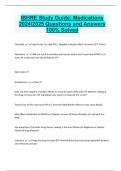
-
IBHRE Study Guide: Medications 2024/2025 Questions and Answers 100% Solved
- Tentamen (uitwerkingen) • 7 pagina's • 2024
-
Ook in voordeelbundel
-
- €12,66
- + meer info
IBHRE Study Guide: Medications 2024/2025 Questions and Answers 100% Solved Flecanide Used for AF. Can stop PVCs. Negative inotropic effect. Increases DFT. Class Ic. Adenosine Will not result in torsades and may be used to test if you have AVNRT, as it slows AV conduction and should halt the SVT Won't alter VT Amiodarone Class III does not have negative inotropic effects so it may be used safely with CHF patients, making it the drug of choice for CHF individuals who need it to treat ...

Die samenvatting die je net hebt gekocht, heeft iemand erg blij gemaakt. Ook wekelijks uitbetaald krijgen? Verkoop je studiedocumenten op Stuvia! Ontdek alles over verdienen op Stuvia


